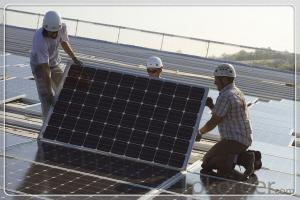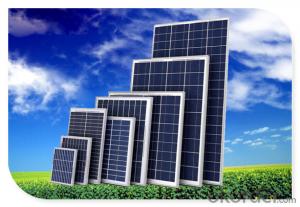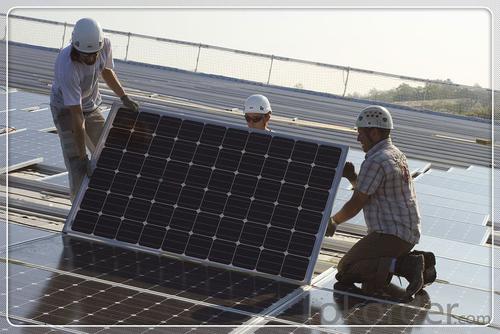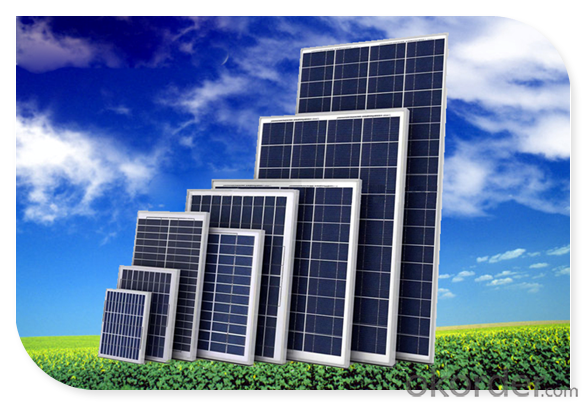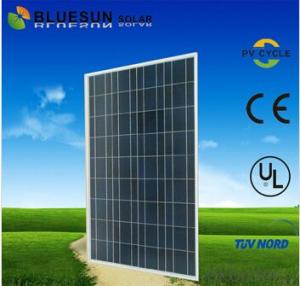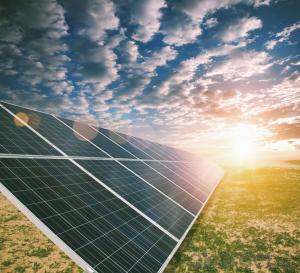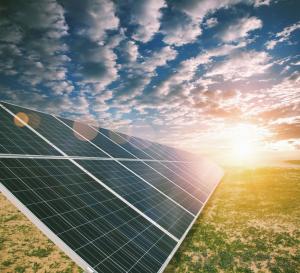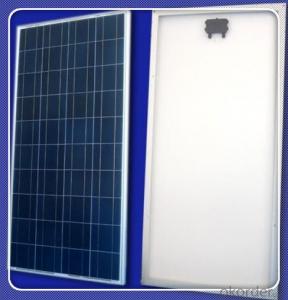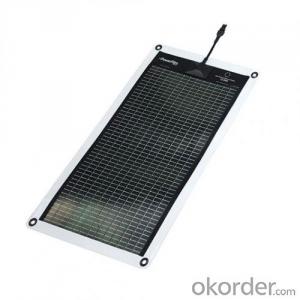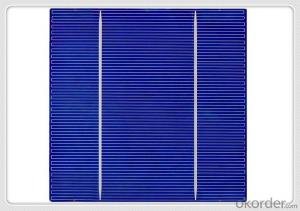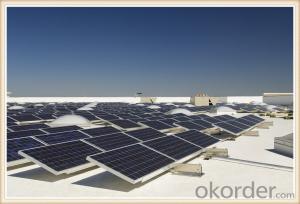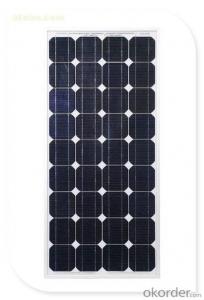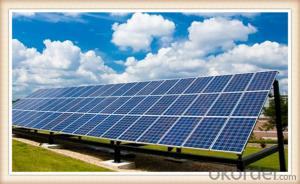80w Efficiency Solar Panels for Deer Feeders - 5-200w Chinese PV Panels
- Loading Port:
- China main port
- Payment Terms:
- TT OR LC
- Min Order Qty:
- 10000 watt
- Supply Capability:
- 100000 watt/month
OKorder Service Pledge
OKorder Financial Service
You Might Also Like
Specification
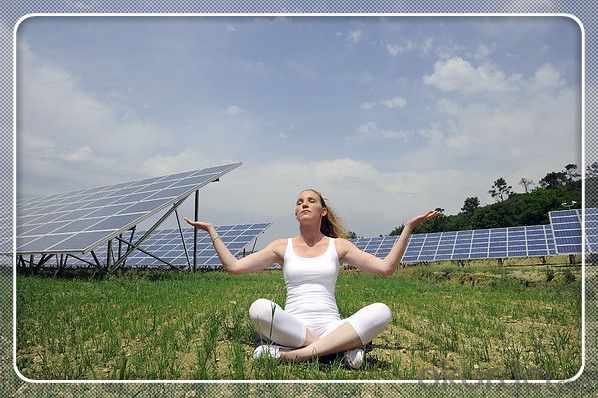
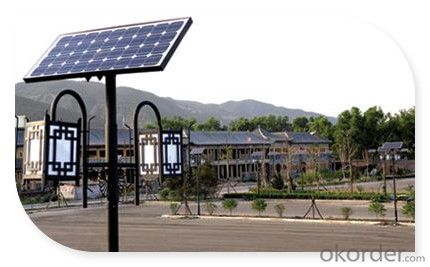
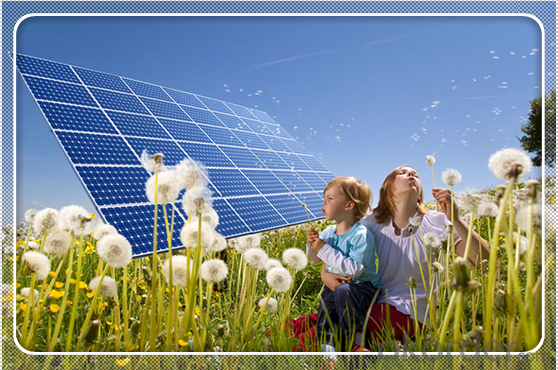
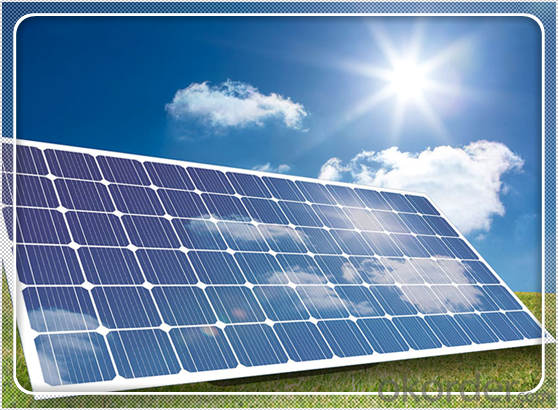
Solar Module Introduction
Solar Module is the core part of solar PV power systems, also is the highest value part of it. The function of Solar Module is to convert the sun's radiation to electrical energy, or transfer it to battery and store in it, or to drive the load running.
The Product has been widely used in space and ground, it mainly used for power generation systems, charging systems, road lighting and traffic signs areas. It could offer a wide range of power and voltage, and with high conversion efficiency, and long service life.
Solar modules use light energy (photons) from the sun to generate electricity through the photovoltaic effect. The majority of modules use wafer-based crystalline silicon cells or thin-film cells based on cadmium telluride or silicon. The structural (load carrying) member of a module can either be the top layer or the back layer. Cells must also be protected from mechanical damage and moisture. Most solar modules are rigid, but semi-flexible ones are available, based on thin-film cells. These early solar modules were first used in space in 1958.
Electrical connections are made in series to achieve a desired output voltage and/or in parallel to provide a desired current capability. The conducting wires that take the current off the modules may contain silver, copper or other non-magnetic conductive transition metals. The cells must be connected electrically to one another and to the rest of the system. Externally, popular terrestrial usage photovoltaic modules use MC3 (older) or MC4 connectors to facilitate easy weatherproof connections to the rest of the system.
Secification
Model Type | |
Peak Power-Pmax(W) | 5-200W |
Open Circuit Voltage-Voc(V) | 44.2 |
Maximum Power Voltage-Vmp(V) | 36 |
Short Circuit Current-Isc(A) | 5.4 |
Maximum Power Current-Imp(A) | 5 |
Maximum System Voltage | 1000V DC |
Maximum Series Fuse Rating | 10A |
Power Tolerance | -1~+3% |
Temperature Coefficients of Pmax | -0.45%/℃ |
Temperature Coefficients of Voc | -0.348%/℃ |
Temperature Coefficients of Isc | 0.031%/℃ |
Nominal Operating Cell Temperature | 44.5±2℃ |
Standard Testing Condition(STC) | Irradiance:1000W/m²;Temperature:25℃;AM=1.5 |
Qualification Test Parameters | |
Operating Temperature | -40℃~+85℃ |
Storage Temperature | -40℃~+85℃ |
Pressure Bearing | ≥5400Pascal/m² |
Wind Bearing | ≥5400Pascal/m² |
Mechanical Characteristics | |
Cell Size | Mono 125*125mm±0.5 |
No.of Cells | 72pcs(6*12) |
Dimension | 1580*808*40mm |
Weight | 15.5Kg |
Glass | 3.2mm High Transmission,Low Iron |
Frame | Anodized Aluminum Alloy |
Junction Box | IP65Rated |
Internal Diodes | 3 Bypass Diodes |
Cable | 1*4.0mm² Length 900mm |
Images
Packing & Shipping:
We have rich experience on how to pack the panels to make sure the safety on shipment when it arrives at the destination.
The normal size is packed by 25pcs/ carton / pallet. Paper carton for FCL shipping and wood carton for LCL shipping.
Warranty:
For c-Si panel: 25years output warranty for no less than 80% of performance, 10 years output warranty for no less than 90% of performance. Free from material and workmanship defects within 5 years.
For a-Si panel: 20 years output warranty for no less than 80% of performance, 10 years output warranty for no less than 90% of performance. Free from material and workmanship defects within 2 years.
FAQ:
(1)What price for each watt?
It depends on the quantity, delivery date and payment terms.
(2)What is your size for each module? Can you tell me the Parameter of your module?
We have different series of panels in different output, both c-Si and a-Si. Please take the specification sheet for your reference.
(3)Can you provide the peripheral products of the solar panels, such as the battery, controller, and inverter? If so, can you tell me how do they match each other?
Actually we are only manufacturer of solar panels, but we could try to source them for you in China if you need. We could provide you an optimal system design to instruct you how to install.
(4)Do you have the CE, TUV, UL Certification?
We’ve already passed all the tests, and any certificate is available.
(5)Have you ever sold your products to companies in my country?
Of course, we have customers in all general PV markets, but I think we should expand our market share along with the market growth.
(6)When did your company set up? You are a new company, how can I believe your quality?
We entered into Solar PV industry in 2005, now we have several plants in manufacturing of a-Si and c-Si panels, and our capacity is 220MW per year. Till now we have already passed all the tests by authorized laboratories, e.g. TUV, VDE, UL.
(7)Can you help us install the module if we cooperate with you?
We haven’t entered into installation sector, but we have the plan in near future.
(8) How do you pack your products?
We have rich experience on how to pack the panels to make sure the safety on shipment when it arrives at the destination.
(9) Can you do OEM for us?
Yes, we can.
(10)Can we visit your factory?
Surely, I will arrange the trip basing on your business schedule.
- Q: The Physics club in our school is trying to convince the Board of Ed to install solar panels in our school, and i was just wondering if anyone with some experience or real expertise in solar energy. I need some points about their usefulness some real pros and cons on maintenance, etc. Anything will help. Personally i would be perfectly for the idea, but i heard that the overall cost of installing them is much higher than the cost of the energy saved and government subsidies, but ive only heard about this.
- You have to approach it as an investment. Ignoring the cost of an inverter for net metering, if we consider a 500 W panel installed for $0 a watt which is $5,000 and consider an average of 8 hours of usable sunlight per day, and at a rate of $0.0 per kWh (schools probably get $0.03 per kWh) then the panel would be saving $2.7 per month in electricity. Considering that the panel has an expected lifespan of 20 years, that would give you an internal rate of return such that the monthly rate satisfies the equation: $5,000 = $2.7 * ( ( - / R^24 ) / ( - / R ) - ) By binary method we get R = 0.99588342. Taking this to the 2th power to annualize it we get Ra = 0.9570 which means that we are getting an annual return of -4.83% per annum so investing in the solar panel is the same as making an investment at an interest rate of -4.83% per year. True interest rates are low and you only get about .3% per annum by putting money in a CD but that still beats investing in solar panels which gives you a negative return on your money. Solar panels need to get a lot better before they are a good investment.
- Q: solar panels!!they are fantastic! cause they are the new way of quot;chargingyour home, without killing the earth!would you install them, or not? and make sure you say WHY
- I would because it will help me consume less energy and it will not have any effect on our planet earth. AlsoThere is no waste involved like you would get with fossil fuels, and no pollution to expel into our atmosphere. In the middle of winter we would normally be using enormous amounts of fossil fuel, proving very costly. Residential solar power does not give us this problem. This will help our planet alot
- Q: Can solar panels store excess energy?
- No, solar panels cannot store excess energy.
- Q: Do solar panels float?
- The ones in my neighborhood installed on telephone poles last year all have bird poop all over them and aren't generating any electricity. They can't even generate enough energy to pay for their construction, installation, and ultimately the work required to take them down and destroy them. Talk about a business case that has nothing but negative return on tax payer investment, all to further the lib agenda. All cost, 0 benefit. Classic lib business thought.
- Q: Can solar panels be installed on walls?
- Yes, solar panels can be installed on walls. While they are commonly mounted on rooftops for optimal sun exposure, they can also be installed on walls using specialized mounting systems. Wall-mounted solar panels are a viable option for locations with limited roof space or where the roof is not suitable for installation.
- Q: is a wind turbine better than solar panels
- Both solar and wind production is largely a function of location. If you live in the southwest where the sun shines most days, maybe solar is an option. If you happen to live in one of the wind corridors, maybe wind is an option. Neither one will be as reliable and cheap as your grid power, though. Best is to concentrate on conservation of energy use.
- Q: Can solar panels be used for powering outdoor lighting?
- Yes, solar panels can be used to power outdoor lighting. Solar panels convert sunlight into electricity, which can be stored in batteries and used to power outdoor lights during nighttime. This allows for cost-effective and environmentally friendly outdoor lighting solutions.
- Q: Can solar panels be installed in areas prone to hurricanes or tornadoes?
- Yes, solar panels can be installed in areas prone to hurricanes or tornadoes, but they need to be designed and installed with these extreme weather conditions in mind. Properly engineered solar panel systems can withstand high winds and severe weather events, but additional precautions may be necessary, such as reinforced mounting systems, impact-resistant glass, and regular maintenance to ensure their durability and functionality.
- Q: Can solar panels be installed on satellites?
- Yes, solar panels can be and are often installed on satellites to generate electricity from sunlight for powering the satellite's various systems and instruments.
- Q: How do you know when it is a good deal to buy a solar panel. For example, what is a good cost per watt, how many volts should I expect, etc.
- Both might be bigger. When it is cloudy and little solar (iciness) you'll have a breeze. When it is nonetheless and sunny, you could have the solar. When the batteries are charged, extra vigour from the windmill can also be shunted right into a resistance heater in a water tank, preheating home water, decreasing that price. Downside of windmills: There is a few noise. you do desire a tower of a few form to get above treeline. It's mechanical, so it's going to want periodic renovation and would possibly holiday, or will put on out, or be broken in a windstorm. Panels will final for many years, simply have to be wiped clean of snow within the iciness, and washed off, in case you are living in a dusty subject. They are hard, however the glass can also be damaged.
Send your message to us
80w Efficiency Solar Panels for Deer Feeders - 5-200w Chinese PV Panels
- Loading Port:
- China main port
- Payment Terms:
- TT OR LC
- Min Order Qty:
- 10000 watt
- Supply Capability:
- 100000 watt/month
OKorder Service Pledge
OKorder Financial Service
Similar products
Hot products
Hot Searches
Related keywords
